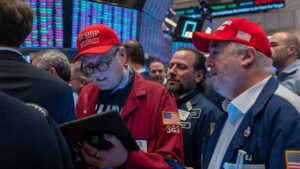Understanding the "Trump Recession": Insights from the Extreme Investor Network
As the economic landscape undergoes tremendous shifts, one term has emerged amidst the chaos: the "Trump recession." This phrase was coined by a prominent CEO in response to a hastily conducted CNBC survey following President Trump’s bombshell tariff announcements. The implications of these tariffs have initiated widespread concern among business leaders, and it’s crucial to break down what this means for investors, businesses, and the broader economy.
The Immediate Aftermath: Market Panic and CEO Concerns
Following the announcement of sweeping tariffs, markets reacted explosively, with a shocking 10% plunge in the S&P 500 within just a few days. This trend has not limited itself to U.S. markets; Asian market futures also mirrored this uncertainty. The cascading effects of such a sharp market downturn signal deeper issues at play, particularly a looming loss of business confidence.
A recent transaction of perspectives from the CNBC CEO Council revealed that the overwhelming majority—approximately 69%—of CEO respondents predict a recession is on the horizon, with more than half of this group expecting impacts to materialize within the year. While the fear of a severe downturn persists, the consensus leans toward anticipating a more moderate contraction.
Rising Inflation and Job Losses: A Direct Impact
The potential fallout extends beyond just economic forecasts. CEOs are bracing for significant repercussions, including job cuts and rising prices. Over a third of executives foresee the necessity of workforce reductions, while 82% expect surging inflation rates affecting everything from consumer goods to corporate expenses.
Federal Reserve Chair Jerome Powell has lent weight to these sentiments, classifying the tariffs as "significantly larger than expected,” and suggesting that prolonged economic effects like higher inflation and sluggish growth are likely unavoidable.
Navigating Uncertainty: The "War-Rooming" Mentality
In the spirit of adaptability, many CEOs are engaging in what has been termed "war-rooming"—a strategy to forecast and mitigate potential crises with suppliers and consumers. As businesses grapple with the reality that some component parts are simply unavailable domestically, the ability to pivot becomes essential.
"I foresee that our suppliers will absorb some of the tariffs while we must pass a portion onto our customers," stated one CEO. The concern over consumer sentiment cannot be overstated; how customers perceive and respond to these changes could very well define the success or failure of businesses in the months to come.
Global Repercussions: The Fear of Boycotts
As American brands brace for possible backlash, the fear of international consumer boycotts looms large. CEOs who operate in various global markets express legitimate concerns about anti-American sentiment influencing their overseas sales. This could have a ripple effect, prompting corporations to make tough decisions about workforce cuts and operations.
The export of services—once a pillar supporting the U.S. economy—may also face challenges. As nations pivot toward protecting their own industries, American service-based companies could find themselves at a disadvantage.
Short-Term Pain for Long-Term Gains? A Divided Opinion
Administration officials remain confident that reshoring initiatives will yield abundant benefits over time, dispelling concerns of immediate economic detriment. However, there exists a palpable disconnect between their optimism and the prevailing sentiment among CEOs, nearly 59% of whom express doubts about the tariffs yielding long-term advantages.
Capital expenditure is becoming a point of contention, with many CEOs signaling delays or reductions in construction projects due to soaring costs associated with tariffs on building materials.
The Path Forward: Where to From Here?
Despite the prevailing uncertainty, it’s vital for CEOs and investors alike to adopt a proactive mindset. At Extreme Investor Network, we believe those navigating this storm must remain agile and informed. Understanding the evolving landscape can position investors to identify opportunities hidden within adversity. The key is striking the right balance—not only reacting to the current economic signals but also anticipating future shifts.
The overarching opinion screams that uncertainty stifles investment. As federal monetary policies remain in flux and trade protocols develop, the willingness to invest hinges significantly on clarity—something the current market is desperately lacking. Business leaders, investors, and everyday consumers must work toward reinstating confidence to combat this cloud of doubt.
In this era of unprecedented change, staying ahead of the curve will be paramount, and at Extreme Investor Network, we’re dedicated to providing you with the insights and strategies needed to thrive in challenging times. Together, let’s navigate this complex environment and seize opportunities that lay hidden amid the noise of the "Trump recession."

